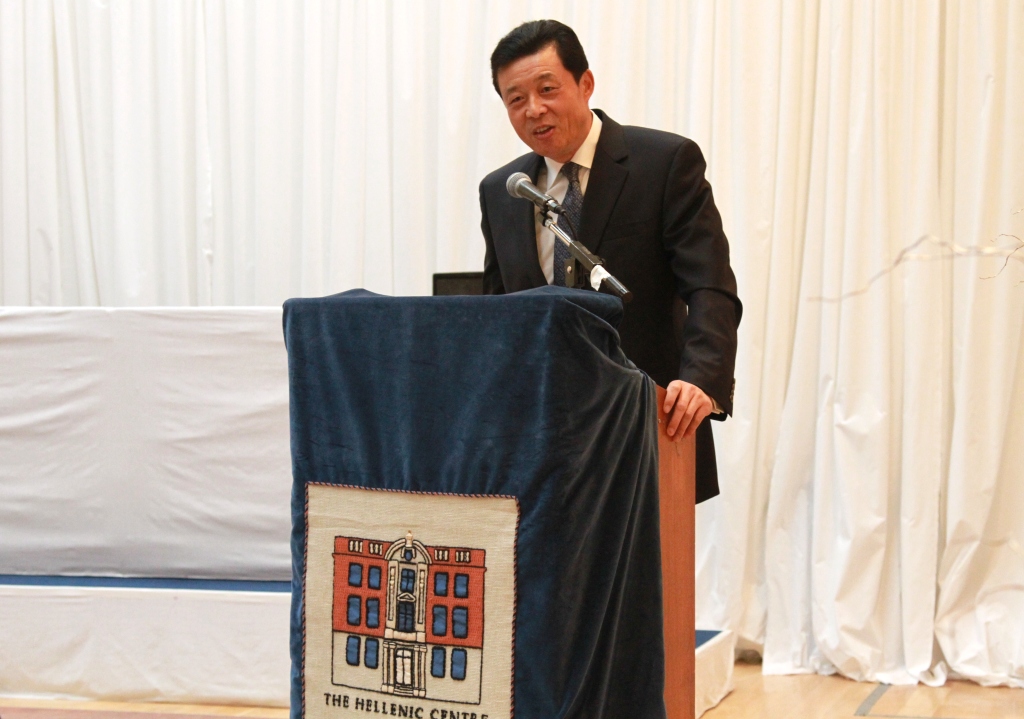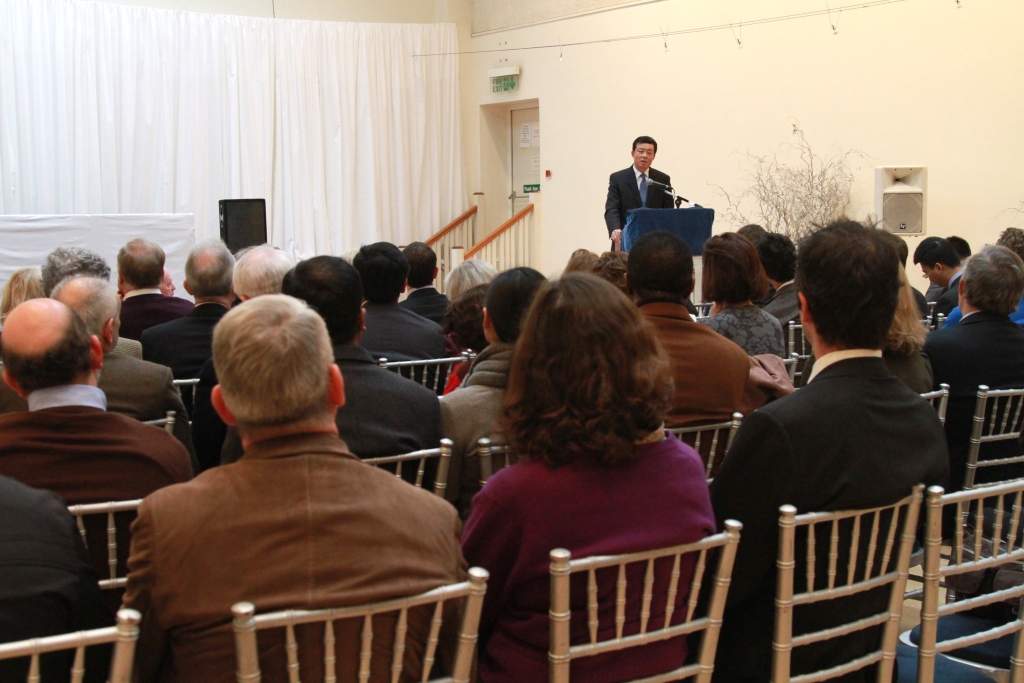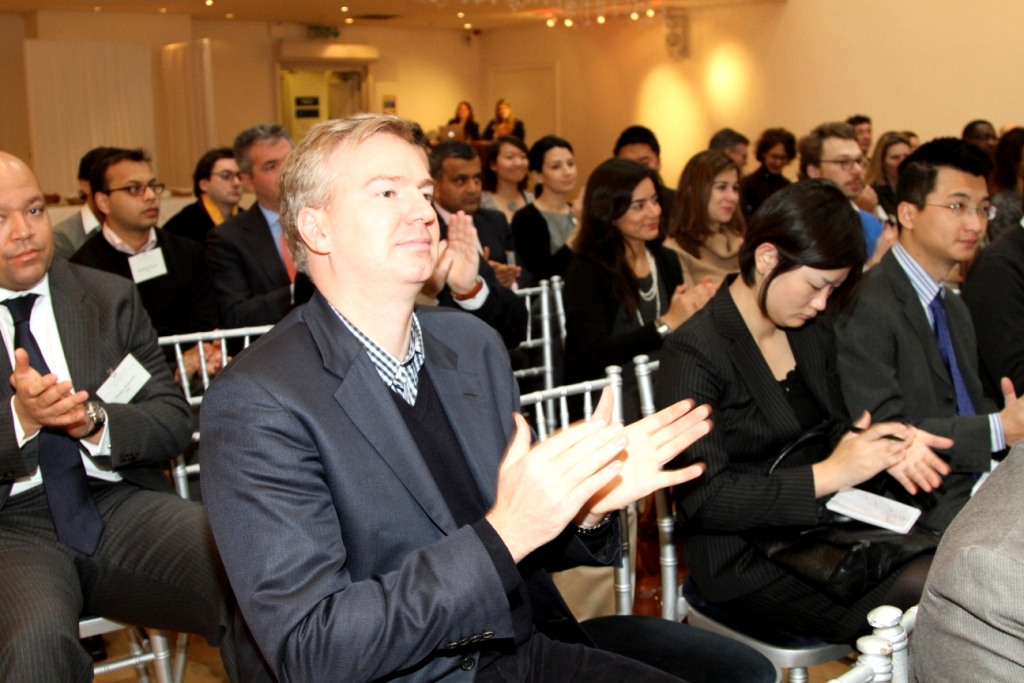|

Dean Stephen Bosworth,
My fellow Fletcher alumni,
It is a great honour for me to address the 8th Annual London Symposium of the Fletcher School. It is a real pleasure to catch up with old friends and get to know new ones. I wish to thank Dean Bosworth for his kind invitation.
28 years ago, I came to the beautiful campus of the Fletcher School as one of the early groups of Chinese students there. That was not long after China started the reform and opening-up and established diplomatic relations with the United States. I still fondly recall the great time I spent as a young student in Fletcher. I learnt a great deal about diplomacy, especially theory of international relations, from which I have benefited even to this day.
After Fletcher, I started a busy diplomatic career, which took me to postings in four continents. All this time I have continued to learn and think about IR theories and tried to come up with my own ideas as my diplomatic experience grew.
These days I have been studying China's relationship with the world. This relationship has gone through tremendous changes in the past 3 decades:
I went to study at Fletcher in 1982, 3 years after China and the US established diplomatic ties. When I told people I came from China, the question was always "Which China?"
Seven years later, I went to Washington DC for my first diplomatic posting in the US at a time of East European upheavals and Soviet disintegration. The hotly discussed question in Western capitals was when China would follow suit.
Ten years later, I was appointed Chinese Ambassador to Egypt. When I visited the Pyramids and other tourist attractions, local vendors always asked,
"Are you from Japan?" "No."
"Are you from Korea?" "No."
They finally asked "Are you from China?"
Today, if someone asks me which China I am from, he must be from another planet.
The hot topic in the world today is more about the rise of China than its fall. Furthermore, with over 50 million Chinese travelling overseas each year, many local vendors can bargain in Chinese for a good price.
Nonetheless, my feeling is that when it comes to China's relationship with the world, there seems to be a gap in mainstream IR theories in the West, as it is quite hard to explain the nature of this relationship today according to existing theories.
When I was studying in Fletcher, Kenneth Waltz had just advocated the theory of structural realism. This became a leading neo-realist theory, playing a big part in shaping US foreign policy. According to structural realism, the international politics is in perpetual anarchy and individual states are all driven by a desire to ensure their survival and security and maximize their national interests. The distribution of power among states is the determining factor in international politics. The rise of one state will inevitably tip the balance, and lead other states to strengthen themselves or seek alliances with others to restore the balance of power. If this theory is valid, China's rise will automatically pose a security threat to the international system.
Apart from structural realism, neo-liberalism, another major school of IR studies, also leads some to conclude that the embrace of the market economy in China will either result in a "westernised" China, or a China that is permanently detached from the western-dominated international system due to ideological constraints.
If one judges the relationship between China and the world on the basis of these two major IR theories, one would either feel pessimistic or disappointed. This, I believe, is largely the result of the inherent flaws of these two theories. For example, structural realism ignores the internal features of individual states, while neo-liberalism is biased towards Western interests. Moreover, both theories emerged in the 1970s and 1980s, when the world was still in the Cold War. Now we live in an era of multi-polarity and globalization. These old ideas are no longer sufficient to explain new realities. We really need to think out of the box.
Goethe said: "All theory is grey, but the golden tree of actual life, springs ever green". Theories should be adapted to a constantly changing world. Otherwise they will lead to the wrong conclusion or create confusion.

For those who observe today's China and analyze the impact of China's development on international relations, the following three aspects merit special consideration:
First, China's development is peaceful.
According to Paul Kennedy in the Rise and Fall of the Great Powers, the rise of dominant powers for the past 500 years has, with no exception, come hand in hand with plunder, conflict and war. China, a country with 1.3 billion people, has never pursued military expansion, or snatched any territory or resource from other countries. Instead, we tried to achieve national rejuvenation and play our role on the world stage through reform and opening-up in the context of political and social stability, through the hard work of the Chinese people, and through free and open trade. This may have never happened before, but it does not make it less true: China has blazed a new path of development that is peaceful.
Take the European Union for example, it started in the 1950s as the Coal and Steel Community and later as the European Community. Now it has 27 states as its members. The EU, an important pole in international politics, was born and integrated into the international system under totally peaceful conditions. It contributed to over six decades of peace in Europe. There is no historical precedence for this great endeavour either.
China's peaceful development can be seen in every aspect of its foreign policy. We pursue an independent foreign policy of peace and develop friendly and cooperative relations with all countries on the basis of the Five Principles of Peaceful Co-existence. We believe that security should be based on mutual trust, mutual benefit, equality and coordination. While safeguarding our own security, we respect the security concerns of others and endeavour to promote common security. We follow a national defence policy solely for the purpose of self-defence. China's military expenditure accounts for less than 1.5% of GDP, not even half of the world average.
China is the largest contributor of peacekeepers among the five permanent members of the UN Security Council. It has sent over 10,000 peacekeepers on 24 UN missions. It has dispatched escort fleets to the waters off the coast of Somalia to work with other naval fleets to combat piracy and safeguard international waters. China has played a major role in the Six-Party Talks on the Korean nuclear issue, working tirelessly for peace and stability on the Peninsula and in the region. As a Chinese ambassador to the DPRK for over three and half years, I know perfectly well about China's efforts in this regard.
China has also taken an active part in the P5+1 consultations on the Iranian nuclear issue. We stay committed to the integrity of the nuclear non-proliferation regime and stability in the Middle East and the Gulf region. China has also engaged with other countries to jointly tackle climate change, energy and resource security and other global issues.
China's peaceful development can serve to further refresh and enrich IR theories. Such refreshing and enriching of theory and practice is necessary for us to keep abreast of new times.
Second, China's peaceful development is based on China's "world view".
IR theories have their roots in Western values, histories, cultures and world views. That is why attempts to frame China's development in Western IR theories often end up in mismatches and confusion.
China believes that our world is in the process of major change and transformation. Peace and development are the defining features of our times. The main factors shaping China's world view include its traditional culture, modern history and perception of the trend of the times. Traditionally, the Chinese people believe that "Do not do to others what you would not want others to do to you", "peace is precious". And we believe in good faith and good neighbourliness. Unlike the individualism valued by Western societies, the Chinese take modesty as a virtue and stand for collective survival and prosperity. Having suffered from foreign invasion in its modern history, China understands the misery of war and the value of peace.
Mr Deng Xiaoping once said, China will never seek hegemony. This statement is not only what the Chinese people think, but is also supported by what happened in the past. We believe that the pursuit of peace, development and cooperation has become an irresistible trend of the times. As countries in the world get increasingly interconnected, it is impossible for China to develop in isolation from the world, and the world's prosperity and stability also requires the contribution from China.
Peaceful development is no empty talk or "smoke screen" for China. It is a national belief and strategic objective anchored on China's view of the world.
Third, China is an active contributor to the international system.
Many people are interested in China's relations with the world. In fact, this is also an issue on our mind. China became a full participant in the international system with its entry into the WTO in 2001. So far China has joined over 130 inter-governmental organisations and acceded to more than 300 multilateral treaties. The West now largely recognizes that China has become part of the international system, rather than undermining it. The only question is: what role should China play in the world?
Many in the West believe that China has the responsibility to join the West in upholding the existing international system. For China, defining its responsibilities in the international system is not as easy as it appears. This is closely related to China's understanding of itself and its identity. To borrow a term from philosophy, it is a question of understanding "Who am I"? Although China is the second largest economy in the world, it also remains a developing country. Its per capita GDP was about 3,700 US dollars in 2009, less than 1/3 of the world average and behind 100 countries in the world. China always believes that countries, big or small, strong or weak, rich or poor, are equal members of the international community. Their interests should be duly respected and protected.
Therefore, China endeavours to play a responsible and coordinating role in the international system, not only participating in but also contributing to the international system. While engaging in extensive cooperation with Western countries, we continue to strengthen traditional friendship with other developing countries and help them develop themselves and reduce poverty. In the wake of the international financial crisis, China contributed 50 billion US dollars to the IMF. We have asked to give priority to the least developed countries in the use of these funds. As a supporter and advocate for multilateralism, we played a constructive part in the reform of the international system. We stand for increased representation of developing countries and greater democracy in international relations. In this way the international system will be better able to address problems and challenges.
The climate change conference in Cancun is watched closely by people around the world. China's actions and contribution to addressing climate change are now widely acknowledged. We firmly uphold the principle of "common but differentiated responsibilities". We have taken voluntary emission control actions in line with our national conditions and pledged to reduce CO2 emission per unit of GDP by 40%-45% in 2020 against the 2005 level. China now ranks the first in the world in terms of installed hydropower capacity, newly added wind power capacity, nuclear power capacity under construction, and the use of solar panels. We call on developed countries to honour their commitment to provide fast-start climate funds worth 30 billion US dollars to developing countries. At the same time, we have made clear that we will never compete for these financial resources with other developing countries. We will only continue to provide material support and capacity building for less developed countries in addressing climate change, within the framework of China-Africa cooperation and through bilateral channels.
China is committed to playing a positive role in the international system and contributing to its sound development. We owe it not only to ourselves but also to the world.
I feel I'm very fortunate to be a Chinese diplomat at this important time. China's development has provided a platform for Chinese diplomats to use their talents, and more importantly, to participate in the shaping and making of history.
I believe all Fletcher students should embrace the ambition of promoting world peace, stability and prosperity, enriching the theories of international relations, and contributing to the development of international system. This is exactly the aim of the Fletcher School, which is "to offer a broad professional education in international relations to students committed to maintaining the stability and prosperity of a complex, challenging, and increasingly global society".
I sincerely hope my fellow Fletcher alumni will look at China's development from a comprehensive perspective and have a better understanding of today's China. It is also my hope that no matter where we are and what we do, we as Fletcher alumni will work together to promote China-Europe relations, China-US relations, and China's relations with the rest of the world.
Thank you.

※ ※ ※
This keynote speech was delivered by Ambassador Liu at the annual London symposium of the Fletcher School of Law and Diplomacy of Tufts University on 4th December. The symposium was hosted by Stephen Bosworth, Dean of the Fletcher School and the US Special Representative for North Korea Policy. Also present were about 100 Fletcher alumni from European countries and diplomats based in London. Following the speech, Ambassador Liu answered questions on the challenges of China's foreign policy, the Korean Peninsula, the Korean nuclear issue, the Six-Party Talks, the South China Sea issue, China's relations with its neighbours, China's financial sector and its international cooperation, China's perception of its role on the world stage, Afghanistan, Pakistan, and the different perceptions by China and the West on human rights.
Established in 1933, the Fletcher School is the longest-existing graduate school of international relations in the United States. It has alumni in 130 countries working for governments, international organisations, businesses, media and academic institutions. This year's symposium was the 8th symposium Fletcher holds annually in London.

|

